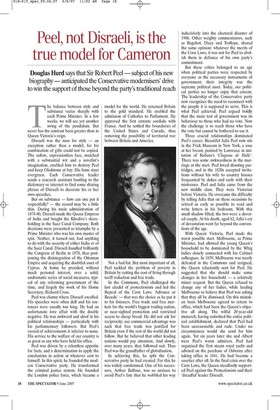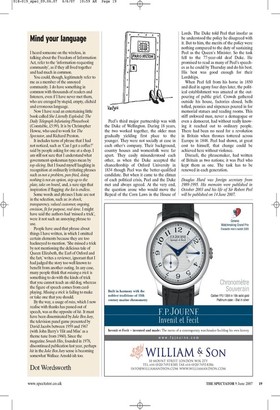Peel, not Disraeli, is the true model for Cameron
Douglas Hurd says that Sir Robert Peel — subject of his new biography — anticipated the Conservative modernisers' drive to win the support of those beyond the party's traditional reach The balance between style and substance varies sharply with each Prime Minister In a few weeks, we will see yet another swing of the pendulum. But never has the contrast been greater than in Queen Victoria's reign.
Disraeli was the man for style — an exception rather than a model, for his combination of gifts could not be copied. The sallow, expressionless face, matched with a substantial wit and a novelist's imagination, enabled him to destroy Peel and keep Gladstone at bay. His fame stays evergreen. Each Conservative leader sends a research assistant bustling to the dictionary or internet to find some shining phrase of Disraeli to decorate his or her own speeches.
But on substance — how can one put it respectfully? — the record may be a little thin. During his main administration of 1874-80, Disraeli made the Queen Empress of India and bought the Khedive's shareholding in the Suez Canal Company. Both decisions were presented as triumphs by a Prime Minister who was his own master of spin. Neither, it turned out, had anything to do with the security of either India or of the Suez Canal. Disraeli handled brilliantly the Congress of Berlin in 1878, thus postponing the disintegration of the Ottoman Empire and acquiring the doubtful asset of Cyprus. At home he presided, without much personal interest, over a solid, undramatic series of social measures, typical of any reforming government of the time, and largely the work of his Home Secretary, Richard Cross.
Peel was clumsy where Disraeli excelled. His speeches were often dull and his sentences were usually too long. He had an unfortunate love affair with the double negative. He was awkward and aloof in his political relationships — particularly with his parliamentary followers. But Peel's record of achievements is inferior to none. His service to the welfare of our country is as great as any who have held his office.
Peel was driven by a relentless appetite for facts, and a determination to apply the conclusions in action at whatever cost to himself. In this spirit, he founded the modern Conservative party. He transformed the criminal justice system. He founded the London police force, which became a model for the world. He returned Britain to the gold standard. He enabled the admission of Catholics to Parliament. He approved the first entente cordiale with France. And he settled the boundaries of the United States and Canada, thus removing the possibility of territorial war between Britain and America.
Not a bad list. But most important of all, Peel tackled the problem of poverty in Britain by cutting the cost of living through tariff reduction and free trade.
In the Commons, Peel challenged the last citadel of protectionism and led the Repeal of the Corn Laws. 'Advance or Recede' — that was the choice as he put it to his listeners. Free trade and free markets for the world's biggest trading nation, or near-sighted protection and restricted access to cheap bread. He did not ask for reciprocity; our commercial advantage was such that free trade was justified for Britain even if the rest of the world did not follow. But he believed that other leading nations would pay attention. And slowly, over many years, they followed suit. Thus Peel was the grandfather of globalisation.
In achieving this, he split the Conservative party he had created. For this he was widely condemned. One of his successors, Arthur Balfour, was so anxious to avoid Peel's fate that he wobbled his way indecisively into the electoral disaster of 1906. Other weighty commentators, such as Bagehot, Dicey and Trollope, shared the same opinion: whatever the merits of the Corn Laws, it was not for Peel to abolish them in defiance of his own party's commitment.
But these critics belonged to an age when political parties were respected by everyone as the necessary instruments of government; their integrity was the supreme political asset. Today, our political parties no longer enjoy that esteem. The leadership of the Conservative party now recognises the need to reconnect with the people it is supposed to serve. This is what Peel achieved. Peel argued boldly that the main test of government was its behaviour to those who had no vote. Now the challenge is to reach those who have the vote but cannot be bothered to use it.
Three crucial relationships dominated Peel's career. Beautiful Julia Peel now sits in the Frick Museum in New York, a rose at her breast, painted by Lawrence in imitation of Rubens's 'Chapeau de There was some awkwardness in the marriage at the start. Peel loved shooting partridges, and in the 1820s accepted invitations without his wife to country houses frequented by dukes and earls with their mistresses. Peel and Julia came from the new middle class. They were Victorian before Victoria. He overcame the difficulty by telling Julia that on these occasions he retired as early as possible to read and write letters in his bedroom. With this small shadow lifted, the two were a devoted couple. At his death, aged 62, Julia's cry of devastation went far beyond the conventions of the age.
With Queen Victoria, Peel made the worst possible start. Melbourne, as Prime Minister, had allowed the young Queen's household to be dominated by the Whig ladies closely connected with his Cabinet colleagues. In 1839, Melbourne was nearly defeated in the Commons and resigned; the Queen reluctantly sent for Peel. He suggested that she should make some changes in her household — a relatively minor request. But the Queen refused to change any of her ladies, while leading Melbourne to believe that Peel was asking that they all be dismissed. On this mistaken basis Melbourne agreed to return to office, which had been the Queen's objective all along. The wilful 20-year-old monarch, having outwitted the entire political establishment, declared that Peel had been unreasonable and rude. Under no circumstances would she send for him again. Yet six years later she and Albert were Peel's warm admirers. Peel had organised the first steam royal yacht and advised on the purchase of Osborne after taking office in 1841. He had become a courtier after all. In the final crisis over the Corn Laws, the Queen steadfastly supported Peel against the Protectionists and their 'dreadful' leader Disraeli.
Peel's third major partnership was with the Duke of Wellington. During 18 years, the two worked together, the older man gradually yielding first place to the younger. They were not socially at ease in each other's company. Their background, country houses and womenfolk were far apart. They easily misunderstood each other, as when the Duke accepted the chancellorship of Oxford University in 1834 though Peel was the better-qualified candidate. But when it came to the climax of each political crisis, Peel and the Duke met and always agreed. At the very end, the question arose who would move the Repeal of the Corn Laws in the House of Lords. The Duke told Peel that insofar as he understood the policy he disagreed with it. But to him, the merits of the policy were nothing compared to the duty of sustaining Peel as the Queen's Minister. So the task fell to the 77-year-old deaf Duke. He promised to read as many of Peel's speeches as he could by Thursday and do his best. His best was good enough for their Lordships.
When Peel fell from his horse in 1850 and died in agony four days later, the political establishment was amazed at the outpouring of public grief. Crowds gathered outside his house, factories closed, bells tolled, pennies and sixpences poured in for memorial statues and reading rooms. This stiff awkward man, never a demagogue or even a democrat, had without really knowing it reached out to ordinary people. There had been no need for a revolution in Britain when thrones tottered across Europe in 1848. Peel had shown, at great cost to himself, that change could be achieved here without violence.
Disraeli, the phrasemaker, had written of Britain as two nations; it was Peel who kept them as one. The task has to be renewed in each generation.
Douglas Hurd was foreign secretary from 1989-1995. His memoirs were published in October 2003 and his life of Sir Robert Peel will be published on 14 June 2007.





























































 Previous page
Previous page